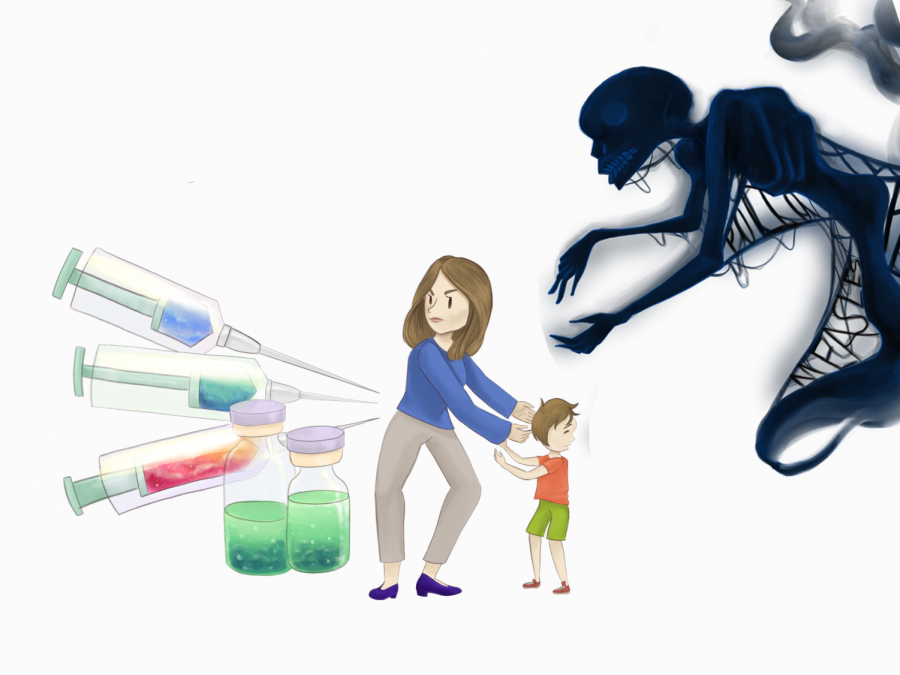Anti-vaxxers threaten public health
March 29, 2019
Anti-vaxxer (n.): a person who is opposed to vaccination, typically a parent who does not wish to vaccinate his or her child. Recently, the anti-vaccine movement has gained plenty of media attention, resulting in many parents refusing to immunize their children. However, the issue is more serious than anyone could have foreseen, with lowered vaccination rates leading to events such as the large measles outbreak in February in Oregon, which kept more than 800 students out of school due to fear, since they did not want to contract the virus as well.
Although vaccination was widely considered one of the greatest achievements in public health of the 19th century, it has always faced opposition. When vaccines were first developed, many believed they were “unchristian” since some, such as the smallpox vaccine, were derived from animals. Others objected because they believed laws requiring vaccinations were a violation of their personal liberty, an argument many in the anti-vaxxer movement use today
“The anti-vaxxer movement got turned into a civil rights argument, resulting in an argument about what extent public autonomy can be taken away for public good, making the issue even more complicated,” said Dr. Aravind Mani, Executive Vice President of the Pacific Inpatient Medical Group.
The controversy surrounding immunization continued throughout the 20th century, when the media began bringing attention to it. Coverage from documentaries such as “DPT: Vaccination Roulette,” released in 1982, and books like “A Shot in the Dark,” published in 1991, focused on vaccines’ potential risks, such as inevitably getting the virus, and minimized their benefits, such as the prevention as well as eventual eradication of many diseases. The misinformation which has continued to spread widely throughout the media has led to widespread participation in the anti-vaccine movement.
“I think that there is a lot of propaganda spread through the media or internet making false claims that vaccines are harmful, which induces fear in the population, and convinces people to not get immunized,” said Dr. Shailaja Kirti, an internal medicine specialist at Kaiser Permanente.
While these concerns persisted into the 21st century, a new concern also arose: a potential link between vaccines and autism. Such suspicions began surfacing around 1990, and in 1995, gastroenterologist Andrew Wakefield began to investigate these speculations. In 1998, Wakefield published a case series study claiming he had found evidence that the measles-mumps-rubella (MMR) vaccine was linked to autism. Wakefield’s study immediately sparked fear among parents, who began to refuse vaccinations for their children. Although this study, along with Wakefield’s medical license, was eventually retracted, as further studies disproved his claims, many still uphold the belief in the correlation between the vaccine and autism since the retraction never garnered as much attention as the initial study did.
“It goes to show that sometimes bad information can spread when people want to believe it badly enough, and I think that’s what happened [with the Wakefield study]—it explained something that people found really hard to explain, in this case, autism,” Mani said.
Refusing to vaccinate children has many implications, and it has been identified as one of the top ten global health concerns of 2019 by the World Health Organization (WHO). Illnesses known to be preventable with vaccinations have begun to reappear due to the decline in vaccinations. This puts everyone at risk, because even those that have been vaccinated are still susceptible to illnesses that could be prevented by vaccines if they have weak immunity.
“My parents always made sure I was vaccinated,” said sophomore Jocelyn Chern. “I used to hate getting shots, especially when I was younger, so when I would protest against it, they would tell me that it does not just protect me from viruses, but it also protects my friends.”
Researchers at Stanford University School of Medicine and Baylor College of Medicine found that a 5 percent reduction in vaccination coverage can triple the number of measles cases in a community. Along with putting others at risk, refusing vaccinations destroys the herd immunity of the community. Herd immunity is resistance to the spread of a contagious disease within a population that results if a sufficiently high proportion of individuals are immune to the disease, especially through vaccination. This protects those who cannot get immunized, like babies, and the immunocompromised, people whose immune system’s ability to fight infectious disease and cancer is compromised, so it is imperative that anyone who can get vaccinated does get vaccinated.
Numerous studies support the notion that vaccinations have no harmful implications. For example, a 2004 study by the Institute of Medicine and nine studies from the Centers for Disease Control and Prevention (CDC) have confirmed that vaccinations do not cause autism. In fact, Dr. Anders Hviid from the American College of Physicians, in observing 657,461 children, found that those with the MMR vaccine were actually 7 percent less likely to develop autism.
Despite the evidence supporting vaccines, many still do not fully trust them. It is also easy for parents to opt their child out of vaccinations due to the various legal loopholes. Almost every state allows exemptions for people with religious beliefs against immunizations, and 18 states grant philosophical exemptions for those opposed to vaccines due to personal or moral beliefs. These shortcuts should be closed off, as all they do is provide parents with easier ways to avoid vaccinating their children, which puts their children and others, at a high risk of catching fatal illnesses.
The WHO could also make the vaccination process more transparent and reduce stigma by leading an international effort to share the practices companies use to create and store vaccines. If companies reveal such information, misleading articles will have less of an effect on people because they will know the truth behind the process that goes into the immunizations.
“I personally tell each of my patients one-on-one why I recommend getting a vaccination, and the benefits it will provide, so that they can be informed about the entire process,” Kirti said.
False beliefs about vaccinations must be broken down because vaccines have protecting the health of communities for years. Without vaccines, society would still be suffering from a sheer number of deaths every flu season, and life spans would be significantly shorter due to susceptibility to illness. Rather than believing false claims found in misleading articles, people should listen to professionals and support vaccination.




































































